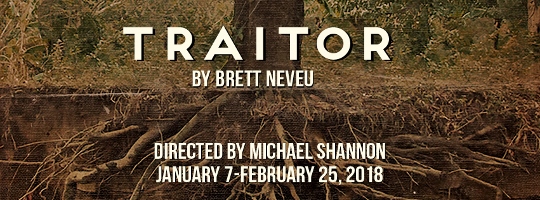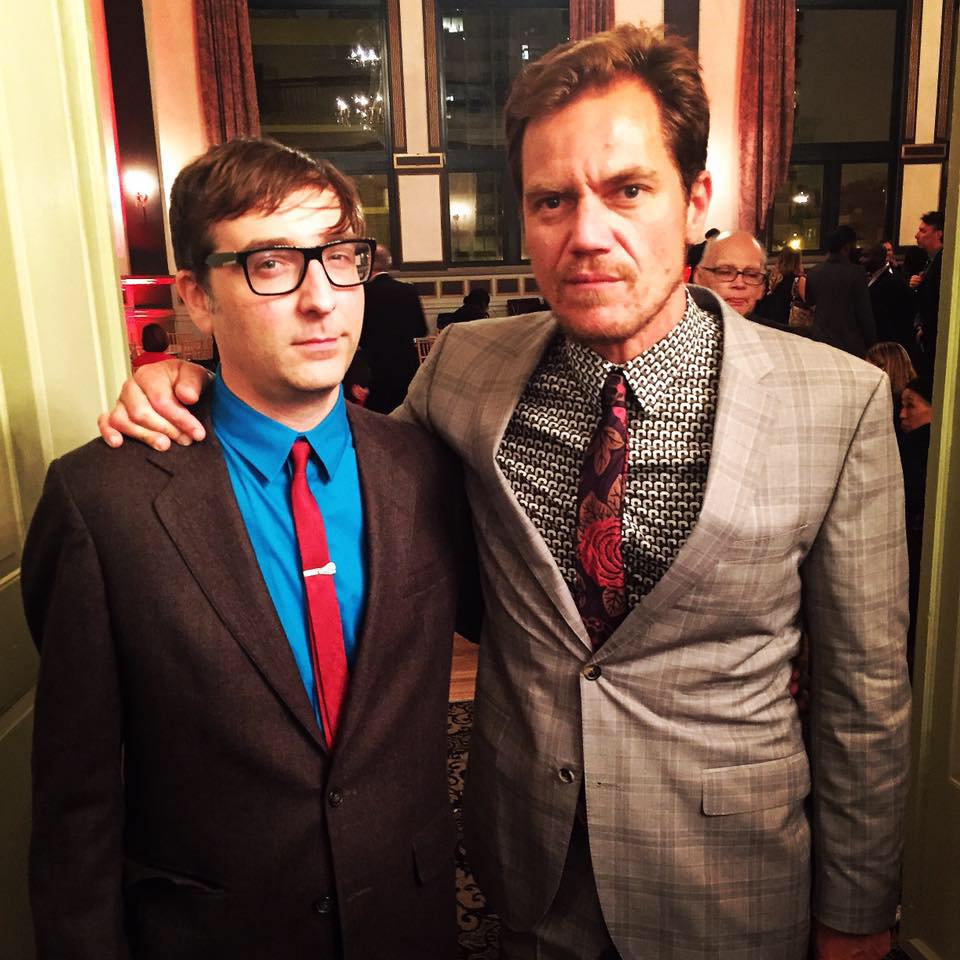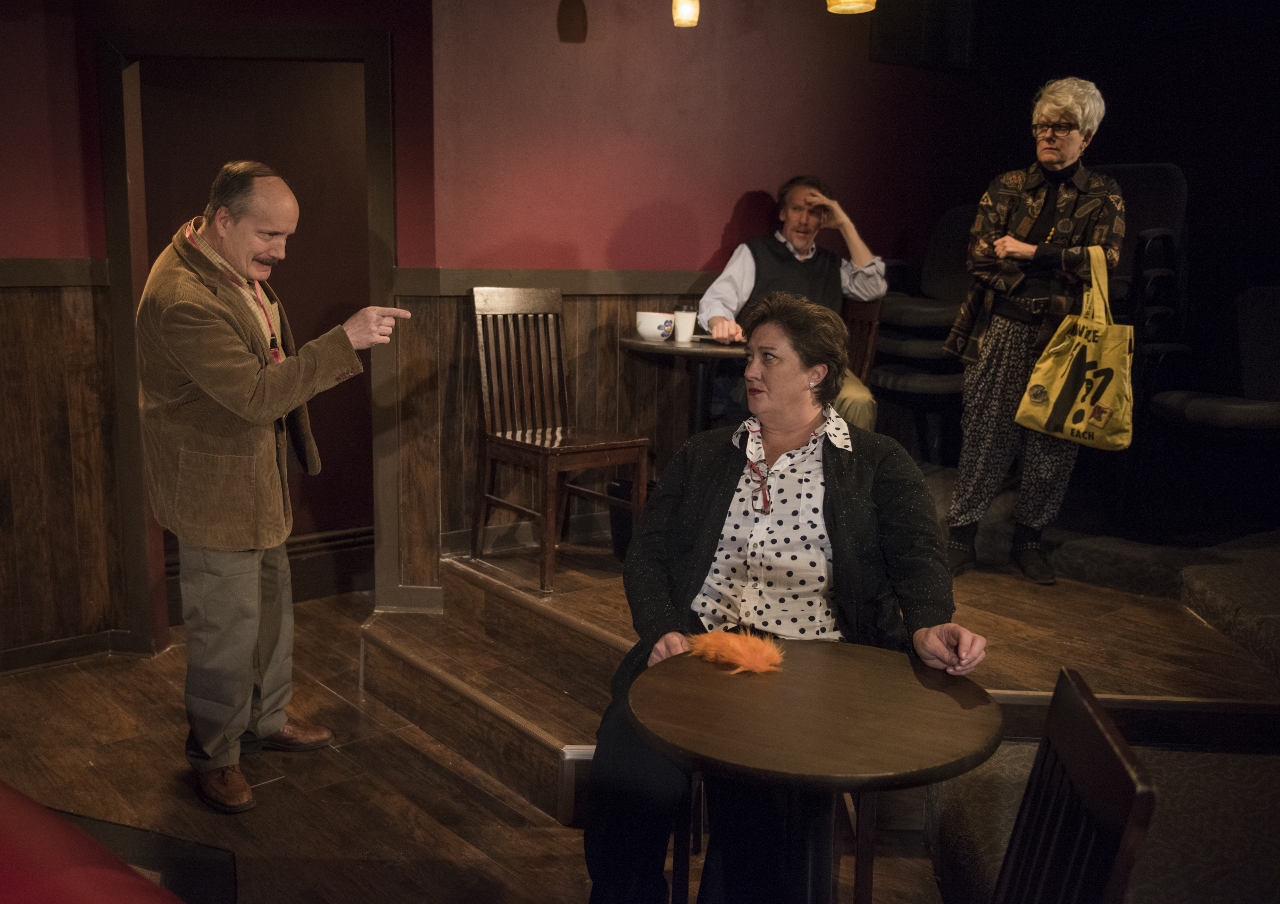I’m in a state of euphoria. I’m fortunate because I was chosen to participate as a towns-person in the world premiere of Traitor by Brett Neveu and  directed by Michael Shannon at A Red Orchid Theatre.
directed by Michael Shannon at A Red Orchid Theatre.
My 2018 goal was to have my first acting experience doing professional theatre. After investing in acting training and taking six ASC classes and three workshops, including Level 3 Scene Study twice and Voice Workshop with Kate DeVore, I decided in December 2017 to get more assertive in submitting my headshot and resume to audition postings. I had two auditions for a play and one for a film in December. Doug McDade, my Camera 1 instructor, always told me to submit for opportunities, (and the book Audition, by Michael Shurtleff states to audition for everything).
When I saw the posting, “Extras for Traitor” on the League of Chicago Theatres website, I emailed my headshot and resume promptly and said a prayer. A Red Orchid Theatre is full of so many talented professionals! They’re also known for high quality, intimate productions. I wasn’t sure what it would entail, but I was excited at the possibility.

The result of my submission was receiving an email from A Red Orchid Theatre’s Associate Artistic Director, (also an instructor at ASC!) Shade Murray which began with:
Dear Toma:
A Red Orchid would like to offer you a role as an Extra in town council scene of TRAITOR by Brett Neveu, directed by Michael Shannon.

Brett Neveu and Michael Shannon
Of course, I gladly accepted! Meeting with the director, Mike Shannon; myself and the five other extras were assigned our roles as East Lake Townspeople. Four of us were assigned roles of husband and wife, parent couples, another a role of a conservative towns-person and for me, a single mother with one or two kids. How the hell was I going to play the role of a mother when I am not one? I pulled from my acting training at ASC.
I remembered what one of my instructors, Jennie Moreau would repeat in class. She would say when we did our scene work, “REMEMBER IT’S CALLED A PLAY! SO PLAY!” It’s important to have fun doing the work and to be willing to try new things! Then I recalled doing a scene in another class from the John Guare play, Landscape of the Body. I played a mother named Betty who has been accused of decapitating her son. Pretty heavy, right? My instructor, Adrianne Cury asked if I had a son or nephew of my own. She suggested I think of a child I know and apply it to the situation in the scene. Of course, this was in hopes that I could get more emotionally invested. Finding a way to identify with the situation is something all actors have to do in order to fully believe the moment. I applied the same principal with my role in Traitor. I turned to the love of my life, my eleven year-old nephew, Daniel. I imagined the situation in the play applying to my nephew. It was easy to get upset about my child going to a charter school in the suburbs that may be sitting on contaminated soil and consequently, poisoning him and the rest of his classmates. I also thought of how Daniel’s mother might react. That helped me to get angry and concerned and helped me to add layers to my work.

A scene from “Traitor” by Brett Neveu
I then reflected how I was lacking Importance in what I was doing, (#8 of the 12 Guideposts).
Guidepost 8: Importance
Raise the stakes. This is not everyday life, but a day of crisis. Today is the day I fight, where formerly I fled. A day when everything changes. It has to be important or the scene falls flat. Add “I” – if you don’t nobody will listen to you. You must personalize.
I was having trouble getting out of my head and leaving my personal life at the front door. Sometimes it’s a challenge to forget about your day, or your issues, or whatever is bothering you at the moment. So, I made the above Guidepost my mantra, “Today is the day I fight, where formerly I fled.” I believe that my importance on stage has improved greatly with practice, personal inventory, meditation, and scene work in classes.
A few other tidbits I incorporated from my acting training at ASC, is that theatre (as well as TV shows and movies) are about real events with real emotional investment. Give the audience something to see, to feel, to understand. Be ready for anything and don’t be afraid to take risks. Although I don’t have any scripted lines in Traitor, it’s important that during my stage time, I’m fully invested in the situation. Despite the serious subject matter, Traitor is actually quite funny, and given the improvisational nature of my scene, every performance is different. Breaking character isn’t an option! The importance of improvisation, (which is something I’ve learned from both Marisa Paonessa and Esteban Andres Cruz ) is an incredibly important skill for the actor, (especially in Chicago). Being focused enough to stay in the moment is imperative. So is working as a team with your fellow actors, not to mention script analysis. Even though I don’t speak any lines, my understanding of the script and being able to analyze it is invaluable not only to my scene, but my understanding of the entire play that I’m a part of. Luckily, these are all things I have learned in my acting training at ASC.
Regardless of how large or small the part, I’ve come to realize that all of the awesome techniques and principals I’ve learned in my acting classes at ASC are a huge part of my evolution as a performer. Even though I just started performing professionally, I feel prepared to tackle any future projects. Thank you ASC!

Toma Lynn Smith is continuing her acting training and is currently enrolled in Applied Viewpoints taught by Esteban Andres Cruz. She also works as an Administrative Assistant at a medical nonprofit for her day job.


